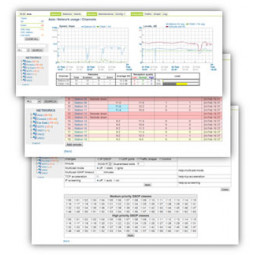UHP NETWORK MANAGEMENT SYSTEM
NETWORK MANAGEMENT SYSTEM
*Based on the highly reliable and compact mini-server with a Flash Disk memory *Easy installation and maintenance on any external Linux OS servers *Protect existing investments -- can be integrated with existing management systems * Multiuser, multilingual Web access from any Internet Browser on the network * Intuitive graphical user interface minimizes training requirements and increases productivity *Compatible with all UHP systems and any other deices supporting SNMP or simply answering to PING *Stable to power interruptions network log with the time stamps * Informative workplace with interactive network map and events log, audible and visible notifications *Advanced statistical tools, ability to export statistical data for further detailed analysis *Preempt performance problems by identifying potential troubles before they affect service quality *Easy network configuration, advanced network recovery tools *Ability to switch between the different modes of network operations just in one mouse clickUHP NETWORK MANAGEMENT SYSTEM
UHP NMS is software tool operating on OS Linux. NMS users may access the system using any authorized computer on the network, with the help of any standard Web browser. There are two levels of access to the system - for administrators and guests.The UHP NMS periodically polls all the controlled network devices using SNMP (Simple Network Management Protocol) protocol. The system verifies if responded parameters are within allowed range and registers any deviations into NMS. The information about actual status of the network devices is displayed in an easy to view tables or graphical form. The UHP NMS collects and stores various user-predefined statistical information about key parameters that could be displayed like graphs or exported into some external programs for further analysis.
UHP CONFIGURATION MANAGER
UHP CM is a software tool based on a Unix/Linux platform and is provided with a multiuser WEB-interface. It provides user-friendly interface to change any network devices configuration. The configuration entered is saved on the Server disk and is used by network relevant devices as a configuration database.
Network devices periodically call for the configuration from the Server via UDP. In its request the device informs of its operation mode, ID and the current configuration version. If a newer configuration version is installed on the Server, the response contains an updated configuration. The Server ignores the requests if no changes of configuration are available.
UHP NMS/CM SPECIFICATIONS
PARAMETER CHARACTERISTIC
User interface Multiuser web-interface
Interface language English/Russian
Operating system Linux core 2.3/2.4
Operating system location On FLASH media
Data statistics location On RAM, with automatic copying onto a FLASH media every 3 hours
Monitoring protocol SNMP, ICMP
Maximum number of monitored Unlimited
devices
Supported equipment NMS: With SNMP support or responding to PING
CM: UHP-1000 and UHP-8000 series satellite routers
Operator paging Visual and audible
Access limitation Three-level access: Observer/Operator/Administrator
